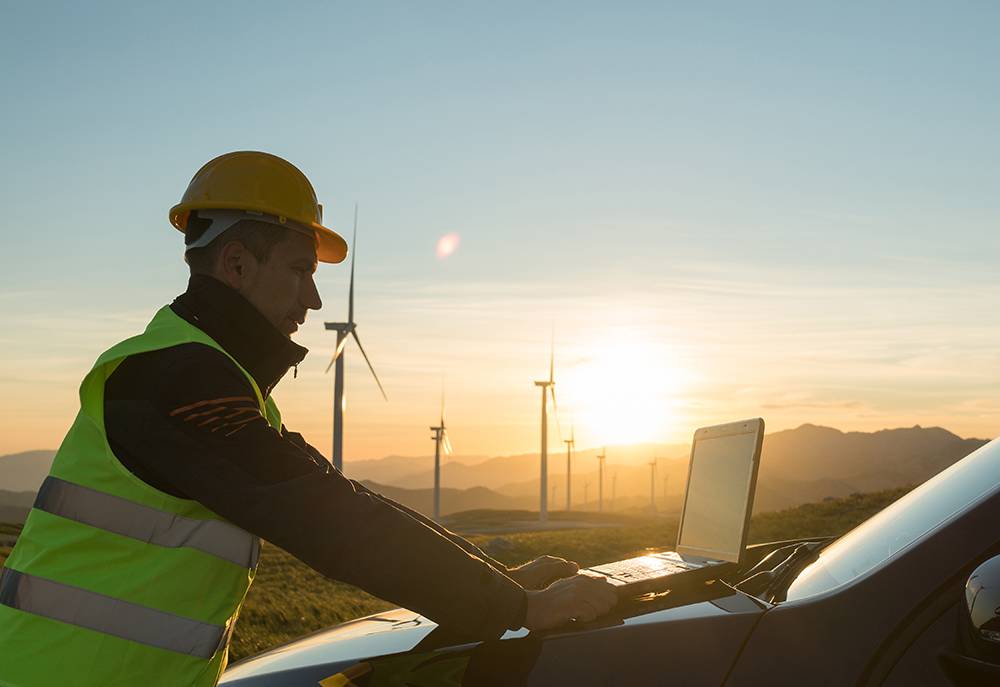The net zero quick wins for business energy
The UK is committed to reaching net zero carbon emissions by 2050. But what steps can your business take right now to help us get there quicker?

What is net zero?
Net zero’s the shorthand expression used to describe the commitment a business makes to reduce its carbon emissions to zero across its whole supply chain. It’s usually to support efforts to keep global temperature increases to 1.5 degrees Celsius, as agreed in the Paris climate summit of 2015.
How can business help the UK reach net zero?
If we’re to avoid catastrophic climate change, then everyone needs to play their part. That includes business. In 2021, the UK business sector’s estimated to have emitted 65.1Mt of carbon dioxide. That’s 19.1% of all our CO2 emissions that year. So, if every business reaches net zero, we’ll be much closer to reaching our goals.
Why should businesses care about net zero?
Climate change is already affecting every single business in the UK. We can all see how it disrupts transport, interrupts power supplies and stops people getting on with their lives. It’s even caused schools and offices to close temporarily in extreme weather events. All of this makes it more difficult to do business. And unless we take action now, it’s only going to get worse. So it’s in your organisation’s own interest to help limit the rise in global temperatures. Net zero is one way to do that.
What can business do right now to reach net zero quicker?
There are several simple steps that every business can take that’ll help everyone. Some you can achieve almost immediately. Others will take a little longer. But they can all deliver quick wins and make a real and lasting difference to your business and our shared future.
Actions for the next month
Measure your business’s carbon footprint
One vital part of your organisation’s commitment to net zero is reporting its carbon emissions. This will help you calculate your carbon footprint.
This includes your business’s Scope 1 and Scope 2 greenhouse gas (GHG) emissions. Scope 1 emissions are those that come directly from your own operations. Scope 2 are those that are associated with your organisation’s energy use. Scope 3 includes all other emissions associated with your value chain. As such, they can be more difficult to report, with fewer options available to reduce them quickly.
Get a smart meter
You need to know exactly how much energy you’re using to see if the changes you’re instigating are making a big enough difference. The electricity usage information that you receive can help you to make further changes to your operations, review them in real time, and make sure that you’re reducing your carbon emissions. A smart meter can help you see that easily and quickly. And they come at no extra cost from your supplier.
Intelligent lighting
Turning off lights when they’re not needed can make a difference. The bigger your business, the greater the effect the change will make. Switching to LED lighting will cut your energy usage, and motion sensitive lights only turn on when people need them. When you choose us as your energy supply partner, you can also save money on your carbon footprint tracking subscription and LED lighting from our partners.
Actions for the next quarter
Switch to renewable source electricity
Choosing renewable source electricity can reduce your carbon emissions instantly. Which means you can report your Scope 2 emissions as zero. Which is why it’s one of the first major changes you should consider making for your business.
Buy Renewable Energy Certificates
Renewable Energy Certificates (RECs) authenticate to the consumer that renewable sources produced the portion of energy to which they relate. So, they enable your organisation to report zero indirect carbon from the electricity you’re buying. That can help you to back up your Corporate Social Responsibility (CSR) or Environmental, Social and Governance (ESG) commitments. They can also help offset any emissions that your business is unable to avoid, once all other measures have been put in place, such as air travel.

Actions for the next six months
Set up a corporate power purchase agreement
A corporate power purchase agreement or CPPA is a way of connecting the energy your business uses to a specific renewable generator. This signals your commitment to net zero as part of your ESG agenda. Because you’re linked to a dedicated generator over a number of years, it could also bring you greater price stability and energy security, helping you to manage your risk.
Optimise your energy use
You can make savings for your organisation at the same time as reducing carbon emissions by optimising your electricity use. You could also benefit if you can commit to using power in a more flexible way through participation in Demand Side Response (DSR), for example.
Actions for the next year
Generate – and sell – your own renewable energy
Imagine if you could turn a cost centre into a potential income-generating part of your business. You can do just that if you invest in generating your own renewable energy. As well as helping reach net zero by introducing more renewable generation and cutting your business energy costs, it could even contribute to your bottom line.
Switch to an electric fleet
Changing your fleet to electric vehicles (EVs) will reduce your business’s carbon emissions. That’s because EVs produce no greenhouse gases at point of use and are more efficient overall than internal combustion engine (ICE) vehicles when it comes to carbon emissions. And if your EVs are always charged with renewable energy, then their emissions during use will effectively be zero. It could also enable you to sell back electricity from your EVs’ batteries to the grid at times when demand – and prices – are high.
Commit to carbon credits
As you cut your Scope 1 and Scope 2 emissions, you’ll be left with indirect emissions from your value chain that you simply can’t abate on your own. Carbon credits offer a solution and are used to mitigate GHG emissions beyond your organisation’s value chain (Scope 3).
One carbon credit represents one tonne of emissions that has been mitigated or removed from the atmosphere. While the majority are reduction credits currently, the Oxford Offsetting Principles encourage carbon removals, which are considered vital if the UK is to reach its net zero goal by 2050.
The market for carbon credits that follow best practice needs to grow massively if we’re to achieve net zero – volumes need to grow, while cost must decline. For this to happen, organisations need to buy credits now. Creating demand will help providers to develop new and better products.
If your organisation’s ready to take the next steps to net zero, then we’d be delighted to help you make these quick wins and more. Please use the form below to get in touch.
Get in touchDisclaimer
We’ve used all reasonable efforts to ensure that the content in this article is accurate, current, and complete at the date of publication. However, we make no express or implied representations or warranties regarding its accuracy, currency or completeness. We cannot accept any responsibility (to the extent permitted by law) for any loss arising directly or indirectly from the use of any content in this article, or any action taken in relying upon it.

